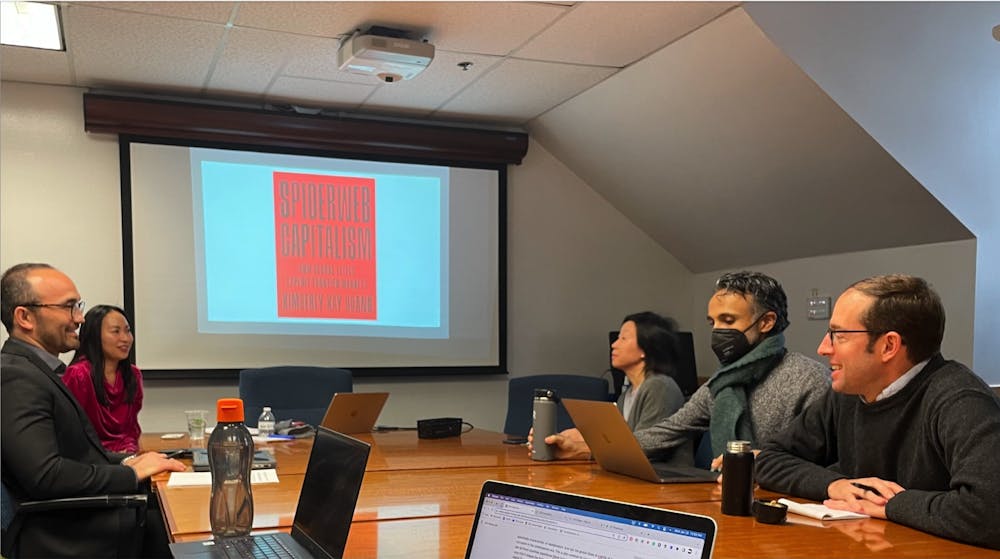Kimberly Kay Hoang discussed her book, Spiderweb Capitalism: How Global Elites Exploit Frontier Markets, in an event held by the Department of Sociology on Jan. 25.
Hoang is an associate professor of sociology and director of global studies at the University of Chicago. At the event, she outlined her book and described the extensive interviews that informed it. The book develops a macro and micro perspective of how offshore shell companies used by the elite impact the environmental, social, political and economic systems around the world.
“Spiderweb capitalism,“ a term coined by Hoang, refers to a network of subsidiaries and offshore finance centers that surpass national boundaries and exclusively benefit global elites. Hoang used over 300 interviews to map the illicit movement of finances through places like Taiwan, Malaysia, Japan and Singapore.
Ryan Calder, the director of Islamic studies and assistant professor of sociology and Islamic studies at Hopkins, introduced Hoang at the event.
In an interview with The News-Letter, Calder shared how Spiderweb Capitalism’s interview-based approach shed a new perspective on the ways wealth moves across borders.
“[Hoang]'s really well-known as an ethnographer, which means someone who goes into situations and observes what's going on and... talks to real human beings and sees what they do and gets to know them even at a personal level,“ he said. “It offers something that's often missing sometimes from sociology and very often from... more abstracted economic analyses of the way capital moves.”
At her talk, Hoang explained that practices used to create these systems exist on a sliding scale of legality, with big players shielded from accountability.
She noted that frontier markets are experiencing faster growth rates than advanced economies.
“Despite these trends, these markets have attracted far more attention from managers and investors than they have from social scientists,“ she said. “We actually know very little about the social relationships that comprise them.”
Hoang’s research went beyond the global movement of capital and investigated the strategies involved in creating spiderweb capitalism.
“In emerging markets like Vietnam and Myanmar, the relationships between private and public sectors are often murky and highly contentious as public officials and private investors provide social services while simultaneously lining their own pockets,” she said.
She added that restrictions meant to mitigate corruption have led to creative forms of bribery. She cited the example of gifting luxury goods, which can be liquidated quickly for cash in secondary markets.
In conjunction with bribery, Hoang discussed how professional relationships between officials, entrepreneurs and investors are cemented through bonding experiences that gradually move from public to private spheres.
“When investors want access to prime real estate or want to be able to complete a project to get the final approvals, it requires entertaining to expedite the excruciatingly slow process,“ she said. “Women are a key part of this erotic triangle for private entrepreneurs to get state officials to sign off on crucial documents.“
During the question and answer portion of the event, Hoang emphasized that spiderweb capitalism is found across the globe, not just in emerging economies.
“What's really hard is that we theorize by a nation-state. We think about this as like there are highly developed economies over here, corrupt economies are there and they're separate; they do different things,“ she said. “What I found is that they're actually woven together. The whole world is their oyster and they’re choosing their legal jurisdictions.”
She described how these financing networks are used by political figures in the U.S. She added that this is not a partisan issue, with celebrities, Democrats and Republicans using offshore shell corporations as loopholes to further their investments.
Hoang stressed the impact of spiderweb capitalism on everyday people‘s retirement funds.
“Ultimately, we are prey because you’re obligated to contribute to your 401k or 403b or whatever, and you have no idea what that index is doing,“ she said. “The reason we’re prey is that we’re the exit, but when FTX blows up, guess what? All the people that got in first are going to get their money out, and the people that are left are the regular retail investors like you and me who are going to pay the bill.”
In an email to The News-Letter, Aila Trasi, a graduate student in the Political Science department, expressed her interest in Hoang’s research.
“I was shocked by the kind of evidence that she was able to collect during her fieldwork and by how skillfully she presented it to the audience,” she wrote. “She's trying to fill an immense black hole in economic sociology and finance — and I'd say this book is a great start in this direction.”





